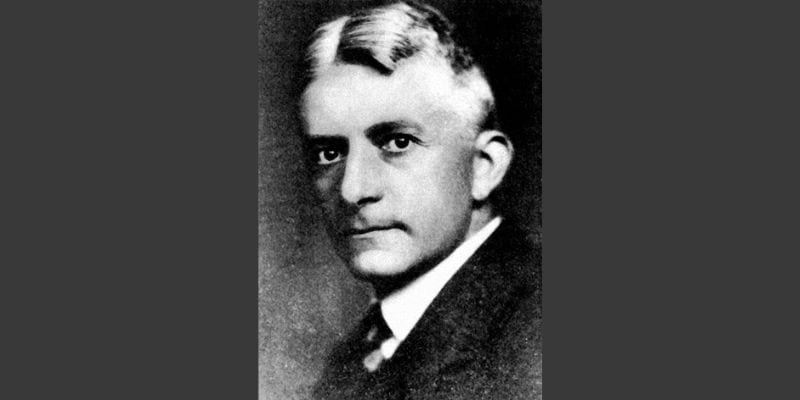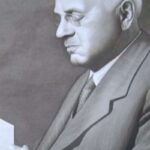Wolfgang Köhler biography, quotes and books

Wolfgang Köhler (January 21, 1887 – June 11, 1967) was a German psychologist and a central figure in the development of Gestalt psychology. Wolfgang Köhler also formulated the Gestalt theory of learning, a psychological framework that describes the processes through which individuals learn. This theory is grounded in the principles and ideas of Gestalt psychology. The following provides an overview of Köhler’s (academic) life and his contributions to psychology.
Biography
Köhler, born in 1887 in Revel, Estonia, earned his doctorate in 1909 in Berlin under the supervision of psychologist and philosopher Carl Stumpf. Subsequently, he served as an assistant and educator at the University of Frankfurt, where he came into contact with Kurt Koffka and Max Wertheimer.
Contribution to Psychology
In 1912, Köhler and Koffka became subjects in studies on perception conducted by Max Wertheimer. Wertheimer’s reporting on these studies marked the inception of the Gestalt movement. Together, these three men are considered the founders of Gestalt psychology.
Wolfgang Köhler and Gestalt Psychology
In 1929, Köhler published his book ‘Gestalt Psychology’. Gestalt psychology is a method of understanding the mind by emphasizing the entirety of something rather than dissecting its individual components.
‘Gestalt’ is originally a German term used to describe the way something is structured, often translated as the ‘whole’.
Gestalt psychology encourages us to perceive and treat the mind and behavior as a whole. This approach brings order to chaos by combining loose information and seeking patterns.
More information on Gestalt psychology can be found in our dedicated article, along with an article on the Gestalt Theory of Learning.
Insight Learning
Another significant contribution by Wolfgang Köhler is the theory of Insight Learning.
This theory differed from the prevailing thought of Edward Thorndike at the time, who believed that animals learned through a process of reward and punishment. In contrast, Köhler posited that animals could use insight to solve problems.
Thorndike’s theory suggested that animal learning was akin to finding the end point in a maze by drawing lines. Every time one reaches a dead end, a new line on a different path is chosen. This makes it a process of trial and error.
Köhler, on the other hand, proposed that, in the maze example, insight could be gained by walking the path backward from the endpoint to the beginning.
This insight leads to the correct path to traverse and provides the solution to the problem. Köhler termed this process Insight Learning, building upon the ideas of Gestalt psychology, where learning occurs through gaining insight into the situation as a whole.
Chimpanzee Experiment
Köhler tested his theory through experiments with chimpanzees.
As the director of the Prussian Academy of Sciences’ anthropoid research station in Tenerife, he conducted experiments on problem-solving by chimpanzees, demonstrating actual instances of insight.
In one experiment, bananas were hung from a ceiling, and the chimpanzees used insight to obtain the bananas. When using a stick proved unsuccessful, the chimpanzees stacked boxes to reach the bananas.
Through his experiments, Köhler identified three characteristics of Insight Learning:
- The solution to the problem is perceived.
- Insightful learning is not dependent on rewards.
- Solving a problem makes it easier to solve similar problems in the future.
His findings were published in Köhler’s 1917 work “Intelligenzprüfungen an Anthropoiden,” followed by the 1921 classic “Intelligenzprüfungen an Menschenaffen,” later translated as “The Mentality of Apes” (1925). These publications underscored the emphasis on insight and led to a radical revision of learning theory.
Later Life
In 1921, Köhler became the head of the psychological institute and a philosophy professor at the University of Berlin, overseeing a series of investigations into various aspects of Gestalt theory. In 1929, he published “Gestalt Psychology.”
Köhler was outspoken in his criticism of Adolf Hitler’s government and openly opposed fascism. In 1934, he had to flee Germany and emigrated to the United States, where he served as a psychology professor at Swarthmore College in Pennsylvania until 1955.
After retirement, Köhler settled in New England, maintaining an office at Dartmouth College. He also became the president of the American Psychological Association and made annual visits to the Free University of Berlin.
Wolfgang Köhler passed away in 1967 in Enfield, New Hampshire.
Famous quotes by Wolfgang Köhler
- “It is hardly an exaggeration to say that a chimpanzee kept in solitude is not a real chimpanzee at all.”
- “Psychology is a very unsatisfactory science.”
- “It would be interesting to inquire how many times essential advances in science have first been made possible by the fact that the boundaries of special disciplines were not respected… Trespassing is one of the most successful techniques in science.”
- “It has sometimes been said that we find nowhere in nature an analogue of the difference between happens and is, on the one hand, and ought, on the other hand.”
- “Common human experience alone is no guarantee with which we can build a science of psychology.”
- “The essential achievement of the human brain is an uncontrolled broadness.”
- “Insight does not happen by marching forward in the direction of the answer, but rather, it comes when we step back from the problem.”
- “Our experiments often produced that pleasant, tingling sensation one experiences when he makes a scientific discovery.”
- “The point of observing any phenomenon is not to understand it, but to understand it in some specific way.”
- “The mind of man can be distinguished from that of animals by the most supreme thing: that of value.”
Wolfgang Köhler books and publications
- 1971. The selected papers of Wolfgang Köhler. New York: Liveright.
- 1969. The Task of Gestalt Psychology. Princeton University Press.
- 1967. Gestalt Psychology. Psychologische Forschung. 31, XVIII-XXX.
- 1959. Gestalt psychology today. American Psychologist, 14(12), 727-734.
- 1958. Perceptual Organization and Learning. The American Journal of Psychology, 71(1), 311-315.
- 1955. Direction of Processes in Living Systems. The Scientific Monthly, 80(1), 29–32
- 1947. Gestalt psychology: An introduction to new concepts in modern psychology. New York: Liveright.
- 1944. Figural After-Effects. An Investigation of Visual Processes. Proceedings of the American Philosophical Society, 88(4), 269–357.
- 1941. On the Nature of Associations. Proceedings of the American Philosophical Society, 84(4), 489–502.
- 1940. Dynamics in psychology. American Psychologist, 16(8), 493-503.
- 1938. The place of value in a world of facts. New York: Liveright.
- 1938. Physical Gestalten.
- 1938. Simple structural functions in the chimpanzee and in the chicken.
- 1937. Psychological Remarks on Some Questions of Anthropology. The American Journal of Psychology, 50(1/4), 271–288.
- 1934. Die physischen Gestalten in Ruhe und im stationären Zustand: Eine naturphilosophische Untersuchung (Physical Gestalten at rest and in a steady state: A natural philosophical investigation). Springer.
- 1931. Zur Boltzmannschen Theorie des zweiten Hauptsatzes. Erkenntnis, 2, 336–353.
- 1929. Gestalt psychology. New York: Liveright.
- 1925. An aspect of Gestalt psychology. The Pedagogical Seminary and Journal of Genetic Psychology, 32(4), 691-723.
- 1925. The Mentality of Apes. New York: Harcourt, Brace.
- 1921. Intelligenzprüfungen an Menschenaffen. Berlin: Springer.
How to cite this article:
Baas, S. (2023). Wolfgang Köhler. Retrieved [insert date] from Toolshero: https://www.toolshero.com/toolsheroes/wolfgang-kohler/
Original publication date: 12/28/2023 | Last update: 12/28/2023
Add a link to this page on your website:
<a href=” https://www.toolshero.com/toolsheroes/wolfgang-kohler/”>Toolshero: Wolfgang Köhler</a>











